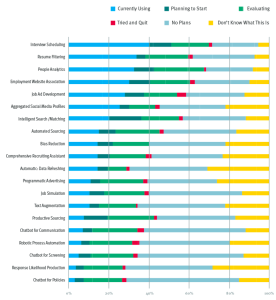The last trade show I went to in person was 2019’s version of the HR Technology Conference & Exhibition. It seems so weird to think of packing into an Uber on the strip, crowding into a session or an expo hall, and, well honestly, the whole thought of going to Vegas isn’t at the top of my list for the foreseeable future.
I bring that up because it felt like I saw approximately three billion AI for recruiting vendors on the floor, all of which had booths larger than my first apartment. In reality, there were a little over 80 vendors at HR Tech that claimed they had some AI, many of which focus — or at least serve — talent acquisition groups.
It was one powerful visual representation of how much AI has been perceptibly pushed into the mainstream, especially in talent acquisition. I say perceptibly because the marketing doesn’t always match the reality.
Still an Early-Adopter Market
HR Examiner’s John Sumser is doing a piece-by-piece breakdown of his latest research on AI in recruiting. In his post on what intelligent tools are organizations using, Sumser cites his survey of 500+ HR and talent leaders that found that the leading use cases were for old-school challenges: interview scheduling and resume parsing.

Even those numbers may seem deceptively high, Sumser reports. He points out that many of the top categories reported are truly on the edges of intelligent tools. Non-intelligent resume filtering is nearly as old as the ATS itself.
Of course, the list gets much more interesting as you get further and further from what a non-intelligent tool can do. Robotic process automation? All kinds of chatbot implementations? A comprehensive recruiting assistant?
We’re clearly still a long way off from asking a super-intelligent computer to find you the perfect candidate, so recruiters can breathe a sigh of relief. But even if this is a rosy view, it’s certainly interesting to see where AI is gaining traction and even places where some of these tools have already been tested and failed.
The Problem With AI
Even well-informed buyers have a tough road ahead in making sense of market claims from a competitive emerging product category.
For example, a look at the G2 recruiting automation software category finds everything from AI-enabled specialty tools like SeekOut to generalists like LinkedIn Recruiter and Kenexa. Talent intelligence makes little sense either, with companies like Eightfold AI mixed in with Infor, both with very specific — and different — problems they are attempting to solve.
“From a user’s perspective, how a tool works rarely matters as much as that it works. Before intelligent tools, this was an almost binary question,” writes Sumser in his analysis of his research. “Beyond the claim on the package, it is difficult to understand what an intelligent tool does. It’s even harder to understand what more it might do and how to improve it.”
Where It Matters: Results
It may not matter much for end-users whether something is truly intelligent. What I find time and time again from talking to talent leaders is that they are on a mission to solve particular challenges, not make a statement about their belief in AI. That makes any sort of vast painting of results like these difficult. Did someone do something truly innovative in AI or did marketing find plausible use cases that make it an easier push into an organization?
That means AI recruiting buyers may range from skeptics to believers. But even for early-adopter friendly industries like talent acquisition, there needs to be something there for them to buy off on. A result they can point to or a budget they can redeploy can be enough.
As we head into 2021, I hope to see more of these tools go through their paces and prove themselves, for better or worse. Clearly, AI still has a long way to go.
